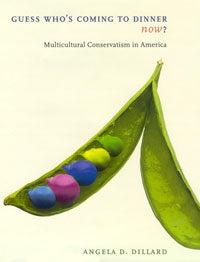Books
In Guess Who’s Coming to Dinner Now? Angela Dillard offers the first comparative analysis of a conservatism which today cuts across the boundaries of race, ethnicity, gender, and sexuality.
To be an African-American and a conservative, or a Latino who is also a conservative and a homosexual, is to occupy an awkward and contested political position. Dillard explores the philosophies, politics, and motivation of minority conservatives such as Ward Connerly, Glenn Loury, Linda Chavez, Clarence Thomas, and Bruce Bawer, as well as their tepid reception by both the Left and Right. Welcomed cautiously by the conservative movement, they have also frequently been excoriated by those African Americans, Latinos, women, and homosexuals who view their conservatism as betrayal.
Dillard’s comprehensive study, among the first to take the history and political implications of multicultural conservatism seriously, is a vital source for understanding contemporary American conservatism in all its forms.
Read the New York Times Book Review for this title
 Spanning more than three decades and organized around the biographies of Reverends Charles A. Hill and Albert B. Cleage Jr., Faith in the City is a major new exploration of how the worlds of politics and faith merged for many of Detroit’s African Americans—a convergence that provided the community with a powerful new voice and identity. While other religions have mixed politics and creed, Faith in the City shows how this fusion was and continues to be particularly vital to African American clergy and the Black freedom struggle. Activists in cities such as Detroit sustained a record of progressive politics over the course of three decades. Angela Dillard reveals this generational link and describes what the activism of the 1960s owed to that of the 1930s. The labor movement, for example, provided Detroit’s Black activists, both inside and outside the unions, with organizational power and experience virtually unmatched by any other African American urban community.
Spanning more than three decades and organized around the biographies of Reverends Charles A. Hill and Albert B. Cleage Jr., Faith in the City is a major new exploration of how the worlds of politics and faith merged for many of Detroit’s African Americans—a convergence that provided the community with a powerful new voice and identity. While other religions have mixed politics and creed, Faith in the City shows how this fusion was and continues to be particularly vital to African American clergy and the Black freedom struggle. Activists in cities such as Detroit sustained a record of progressive politics over the course of three decades. Angela Dillard reveals this generational link and describes what the activism of the 1960s owed to that of the 1930s. The labor movement, for example, provided Detroit’s Black activists, both inside and outside the unions, with organizational power and experience virtually unmatched by any other African American urban community.
Articles
“Black Power/Black Faith: Re-Thinking the `De-Christianization’ of the Black Power Movement,” forthcoming in Doug Rossinow, Molly Beck and Leilah Danielson, eds. The Religious Left in Modern America: Doorkeepers of a Radical Faith (Palgrave Macmillan, 2018).
“When the Alt-Right Hits Campus: White Nationalism, Protests, and Diversity Planning,” Against The Current (January/February 2017)
“In Defense of Law and Order: The March on Washington and Its Black ‘Conservative’ Critics,” Special Issue on the 50th Anniversary of the March on Washington, German Historical Institute Bulletin, 2014
“Malcolm X and African American Conservatism,” The Cambridge Companion to Malcolm X, ed. Robert Terrill (Cambridge University Press, 2010), 90-100
“Adventures in Conservative Feminism,” Society 42:3 (March/April 2005): 25-27.
“Conservatism and the New Black Elite,” New Labor Forum 13:1 (Spring 2004): 31-38
“Religion and Radicalism: The Reverend Albert B. Cleage, Jr. and the Rise of a Black Nationalist Coalition in Detroit,” Freedom North: Black Freedom Struggles Outside the South, 1940-1980, edited by J. Theoharris and K. Woodward (St.Martin’s/Palgrave, 2003): 153-175
“A Multicultural Right?: Can the GOP Build a Coalition?“, Dissent (Winter 2001): 113-117
“Multicultural Conservatism: What It Is, Why It Matters,” Chronicle Review, Chronicle of Higher Education, March 2, 2001, B7-B10


